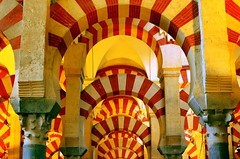During the Islamic Golden Age (fl. 622 CE - 1258 CE in Common Era calendar; or 1 AH - 656 AH in Islamic calendar), scholars and engineers of the Islamic world contributed enormously to philosophy, science, and technology, both by preserving and building upon earlier traditions and by adding their own inventions and innovations. Scientific and intellectual achievements blossomed in the Golden Age, and passed on to Europe to be expanded upon in the European Renaissance.[1]
The Muslims of the Iberian Peninsula (Spain and Portugal) , who ruled between 711 and 1492, are commonly known as the Moors. The territory, which they called "Al Andalus", initially included much of Spain, Portugal and parts of southern France.
The word Moors is a corrupted word referring to the people who came from Morocco (Mauri). Later, other words such as Moriscos and Mudejares were used.
The golden age of al-Andalus: crops produced using irrigation, along with food imported from from the Middle East, provided the area around Córdoba and some other Andalusī cities with an agricultural economic sector by far the most advanced in western Europe.
Among European cities, Córdoba, with a population of perhaps 500,000, was second only to Constantinople in size and prosperity.
Within the Islamic world, Córdoba was one of the leading cultural centres. The work of its most important philosophers and scientists (notably Ibn Rushd ("Averroes") had a major influence on the intellectual life of medieval western Europe.
Muslims and non-Muslims often came from abroad to study in the famous libraries and universities of al-Andalus. This transmission was to have a significant impact on the formation of the European Renaissance.
The Caliphate treated non-Muslims differently at different times. The longest period of tolerance began after 912, wherein the Jews of Al-Andalus prospered, devoting themselves to the service of the Caliphate of Cordoba, to the study of the sciences, and to commerce and industry, especially to trading in silk and slaves, in this way promoting the prosperity of the country. Southern Iberia became an asylum for the oppressed Jews of other countries.
Notes:
711 AD: Muslim invaders crossed the Strait of Gibraltar to conquer most of Spain.
Great cities of Andalusia, or southern Spain, were Sevilla, Granada and Cordoba.
Arabs controlled much of Spain from about 700 AD to almost 1500 AD.
* architecture (Alhambra Palace)
* science (astronomy, medicine)
* music and dance (guitarra, flamenco dance)
* Literature, esp. poetry.
The Crusades, app 1100 to 1300 AD, saw the French and English armies going to Jerusalem to fight Muslims over control of the Holy Land.
The Spanish Inquisition:
The word inquisition (from the Latin: inquisitio) is the act of inquiring. It was broadly used in law, before the Medieval Inquisition, to refer to a common law procedure of inquiring into a matter, investigating, usually through interrogation, and by use of force. Over time, it was gradually associated with judging heresy against Christianity.
The reconquest of Spain from the Moors resulted in a relatively peaceful multi-religious society, but violent anti-Judaism ensued and Jews converted en masse to the Catholic faith. Some of these conversos were suspected of not being sincere converts and the Alhambra Decree in 1492 ordered all Jews to leave their kingdoms, making about 40,000 Jews leave.
Sixtus IV later accused the Spanish inquisition of being overzealous, accused the monarchs for being greedy and issued a commend to stop it, but he was pressured into withdrawing the restriction.
During the 16th century the main target became Protestants. In time converts from Islam and Moriscos were also persecuted by the Spanish Inquisition. Other crimes were also taken up in these tribunals such as Superstitions, heretical propositions, Sodomy, Bigamy and solicitation.
The Spanish Inquisition was an institution at the service of the monarchy.
Subscribe to:
Post Comments (Atom)


No comments:
Post a Comment